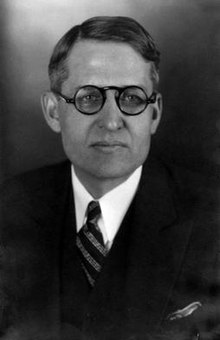Harvey Fletcher | |
|---|---|
 | |
| Born | September 11, 1884 Provo, Utah, U.S. |
| Died | July 23, 1981 (aged 96) Provo, Utah, U.S. |
| Alma mater | Brigham Young University University of Chicago |
| Known for | Invention of the hearing aid The father of stereophonic sound Oil drop experiment measuring the charge of the electron |
| Awards | Presidential Citation Louis E. Levy Medal (1924) ASA Gold Medal (1957) Audio Engineering Society Gold Medal Award (1958) IEEE Founders Medal (1967) Grammy Award (2016) |
| Scientific career | |
| Fields | Physics |
| Institutions | Western Electric Bell Laboratories Columbia University |
| Doctoral advisor | Robert A. Millikan |
Harvey Fletcher (September 11, 1884 – July 23, 1981) was an American physicist.[1] Known as the "father of stereophonic sound", he is credited with the invention of the 2-A audiometer[2] and an early electronic hearing aid.[3][4] He was an investigator into the nature of speech and hearing, and made contributions in acoustics, electrical engineering, speech, medicine, music, atomic physics, sound pictures, and education. Following his death, he was credited with collaborating with his doctoral advisor, Robert Millikan, on the Nobel-prize winning oil drop experiment which first determined the charge of the electron.[5]
- ^ Gardner, Mark B. (October 1981). "Obituary: Harvey Fletcher". Physics Today. 34 (10): 116. Bibcode:1981PhT....34j.116G. doi:10.1063/1.2914315.
- ^ Fletcher, Tom. "In Memory of Harvey Fletcher".
- ^ William M. Hartmann (January 9, 1997). Signals, Sound, and Sensation. Springer. pp. 72–. ISBN 978-1-56396-283-7.
- ^ Fletcher, Stephen H. (1992). "HARVEY FLETCHER 1884-1981" (PDF). NAS Online. National Academy of Sciences. Retrieved November 20, 2015.
- ^ David Goodstein (January 2001). "In defense of Robert Andrews Millikan" (PDF). American Scientist. 89 (1): 54–60. Bibcode:2001AmSci..89...54G. doi:10.1511/2001.1.54. S2CID 209833984.